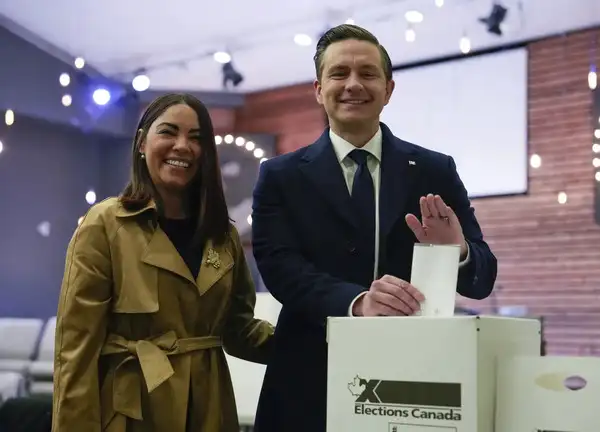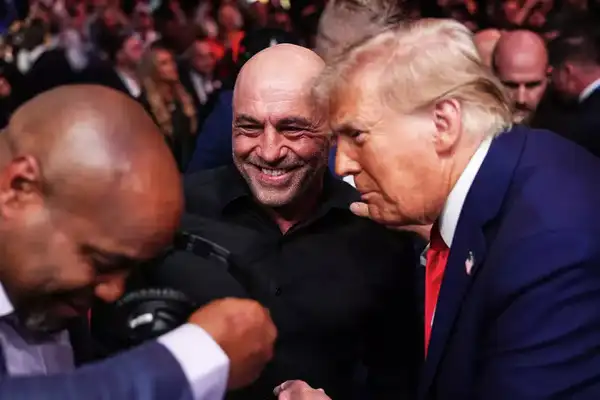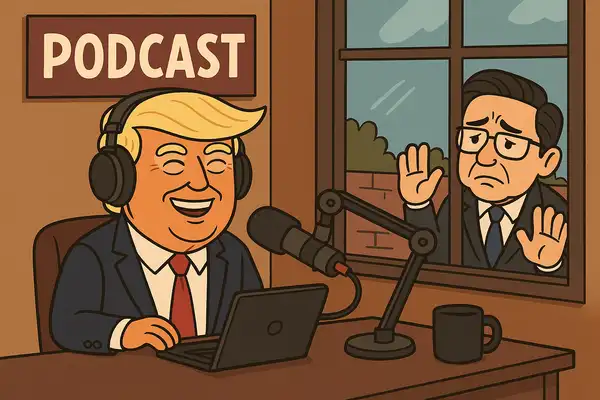Canada Election 2025: Could Pierre Pilevere Donald Trump win with a podcast strategy? , world News

Pierre Pilevre should have been cruel to win. The conservative leader had speed, money and a national movement against Justin Trudeau’s liberal heritage. But instead of winning Big, he lost his seat in Carlton. And the reason for this cannot be found in policy or voting – but in a microphone.
A post-CNN, Post-CBC in the world, where voters rely on the creators more than the anchor, Donald Trump found a lifeline in 2024: Podcast. Long-form, low-rebellion, emotionally resonant podcast. Pierre Pilevre, for all his digital lover, missed the wave. And that Miss may have given her the price of Carlton.
Orthodox Tsunami, Local ShipWrake

Conservative leaders Pierre Poilevere, Right, and his wife Anada Poilavere cast their votes in the federal election in Ottawa. (AP/PTI Photo)
In the federal election of 2025, the Conservative Party looked unbeatable. In the establishment of furious, housing unattractive, and liberal fatigue with inflation, the message of poelavere echoed. Orthodox nationwide votes were voting more than 40% and provoking liberals in swing provinces.
But in Carlton – a suburban Ottawa seat Poilavere – the ground transferred since 2004. Liberal candidate Bruce Fangoy, a local engineer with Little National Profile, flipped the ride by 3,837 votes. Voting? Most in Canada, one shocking 82%.
The observers pointed to decency. Poilievre spent the last week of the campaign hosting national rallies and viral town halls, ignoring their own backyard. “I think he rode the ride,” Fangoy called Post-Victori. “When he was filming the reels, I was knocking at the door.”
But there was something deep below the neglect of that surface-level: the failure of the poison in reaching the young, politically active voters where they are actually on YouTube, on the spotify and inside the podcast apps.
Lost Youth of Canada
At the national level, Poilievre won Youth voting On paper. According to Reuters, 49% canadian people in the age group of 18-34 supported the conservatives. But voting data is a bad option for voting. And in riding like Carlton, the young voters turned into a draw – but not for the pool.
This was not because young voters did not care about housing or inflation. Many did it. But when the economic message of Pilevre echoed, his cultural tone went back again. In particular, women reported inconvenience with their combative personality. Socially conscious students saw him as opposed to climate and equity goals. Progressive youth come out to stop him – do not support him.
The more important thing is that the young poelev won-economicly concerned, politically fluid was not beyond the 20-Somethings-elections. They were not engaged. And this is because he never talked to him on his platforms.
The Sound of Silence: Polyvere’s Podcast Zero

Joe Rogan and Dana White. Photo by Jeff Botary / Zafa LLC / Getty Image
In 2025, about one-third of Canadian adults listen to podcast monthly. Among the children of 18-34-Year, the number is close to 50%. Weekly podcast listeners consume more than five hours per week – more than linear TV. And 64% of podcast fans say they turn towards them for news and analysis.
But poolere, eagerly, left the podcast circuit. Despite being a native of social media, he ignored long -term formats in favor of Facebook snipets and hostile press clips. His only notable podcast sit-down? Jordan Peterson’s show presence of 2022 – a site to reach Mardli Swing voters.
While the liberal CBC podcasts and influencers appeared in the YouTube show, Bruce Fangoy did old school-school canvasing, poolvare rely on algorithm wiring. His campaign clicked, but clicks do not cast ballots.
What happened to the south of the border in 2024, contrast.
Trump’s podcast blitz
Donald Trump’s return to the White House was not just about Biden’s fatigue or economic angle. It was a masterclass in the new media promotion, and had a podcast strategy in his heart that was champion by his son, Baron trump,
While Kamala Harris tipped through the curated podcast show, Trump strangled. He who appeared on the rogan experience – the most impressive podcast in the world – with more than 14.5 million listeners per episode. That single conversation watched more than 46 million times on YouTube, dwarfing cable news primetime.
Trump Full Send, Theo Von, Autakik and even fringe Twitch streamers. UFC’s Dana White publicly thanked Nelk Boys, Edin Ross and others for helping young male voters to raise voters. The campaign coordinated the $ 20 million gate-out-out drive-“Send of votes”-it specifically targets people under 35.
The results were shocking. According to Fox News, more than 210,000 voters were first collected-many of them through podcasts, not advertising.
Trump’s presence was not polished. They were not always accurate. But they were long, intimate and human. He cracked jokes, shared memories, and ran away with the hosts who let him speak uninterrupted.
It was not just a media strategy – it was a personality rehabilitation. For millions of unspecified men, Trump became familiar. Not President, but personal.
Kamala’s Miss, Masterstroke of Baron
Kamala Harris, on the contrary, avoided shows such as Rogan. His team feared backlash. She clung to safe outlets such as her daddy and club shaya shaya, who performed well – but there was a lack of political growth. This caution left a vacuum and was happy to fill Trump. And behind that aggressive podcast push was Baron Trump.
However, in college, Baion also played a quiet but impressive role. He advised the campaign’s digital team, helped shape outreach strategies, and allegedly pushed the rogan for Trump and pushed to join the rogan-sons. Bairon understood that podcast is not only about exposure – they are about access. They feel the politicians less and more like guests in your living room.
Pierre Poilavere had no baron. And no rogan.
What polyvere missed
The irony is that there was a profile to flourish on the podcast. That is clear. He is combative. He thrives in debate and has the command of Youtuber’s pacing.
But he treated all media – lover and alternative – with equal doubts. He did not just freeze the CBC. He gave a ghost to the new generation of independent platforms, where General Z and Millennials spend their time. Even a cancelland, hub dialogues, or a single appearance on this matter would have softened their image, or explained their policies beyond slogans.
Instead, he allowed others to define him. His critics depicted him as reactionary, angry and isolated. And many young voters, only listening to that story, believed it.
Lesson for next election
Poilievre’s podcast blackout is now a case study in a missed opportunity. His campaign was digitally clever – but was not digitally strategic. He mastered the short-form Panchline, but ignored long-term persuasion.
Meanwhile, Trump’s strategy suggests that podcasts are not just another com’s channels-they are now central for coalition-building. They provide a sense of depth, relativity and an unfliest conversation that young voters demanded rapidly.
To win in the 2020s, a politician must be present at the places where opinions are formed – not only where the headlines break. CBC is optional. There is no rogan.
Mike is always on

In 2024, Trump turned a hostile press environment into an opportunity. He sidelined the heritage media, embraced podcast culture, and allowed the effectives to lift heavily. That strategy – more than any one advertisement or debate – won the White House.
In 2025, Pierre Poilavere had issues, energy and edges. But he lacked medium. While Trump spoke in millions of earbuds, poilevere shouted in a void. Finally, it was not a generous strength that defeated him in Carlton. It was his silence in a media format, where the youth were the most tuned. He did not lose to Fangy. He lost to a missed mike. Next time, Canadian politicians may want to trade their press release for podcast booking. Because in modern politics, you don’t just need a message – you need a feed.




